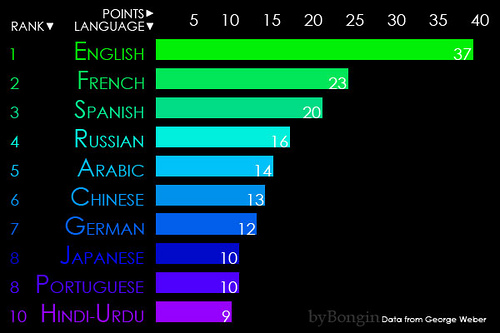While it’s useful to know the stats – how many people in how many countries speak which languages – this doesn’t always translate into the answer to the question: which are the most influential languages in the world? The influence of a language is more complex than the raw data. Informed opinion from linguists and cognitive scientists suggests that influence is governed not so much by a language’s attributes as by how it connects to others.
- You may find it interesting that written language and the media, when examined, reveal that journalists looking for global impact will publish first in their native language and then in those languages that they think will capture the world’s attention. Scanning diverse outlets including book translations, Wikipedia and Twitter researchers found that English presently remains at the pinnacle of influential languages in this respect.
- After English, there are three separate language networks with the capacity to make connections because of past colonial and historical backgrounds. These networks incorporate Chinese, French, German, Portuguese and Russian.
- Ironically, it seems that social media networking is just as likely to promote linguistic isolation as improved connectivity. Consider, for example, the fact that more Chinese people are online than those of any other nationality. All well and good, however, the sites they use most frequently include Baidu Baike (Chinese Wikipedia) and Sna Weibo (Chinese Twitter). You will appreciate that this actually limits the influence of Mandarin.
- Conversely, Twitter has helped to promote the spread of languages that are less widely spoken which we can easily learn online or in classes, such as Filipino, Malay and Swahili. An examination of the dataset indicates that these languages have substantial shares – larger than expected. It seems therefore that people speaking them favour less formal channels of communication.
Multilingualism
Which countries and cities do you think are multilingual in nature? This is not related to how many different languages are spoken in a given locality, for example London, but rather to how many members of the population have multiple languages, and use them. Here are a few examples.
- Luxembourg: French and German are spoken by everyone and together with English are compulsory in schools. Luxembourgish is a German/French hybrid and is used by locals.
- Aruba: Dutch, English and Spanish are taught in schools. Papiamento is used by locals and is a Creole blend of Portuguese, Spanish, Dutch and English.
- Singapore: Chinese (Mandarin), Malay, Tamil and English are official languages however most residents are fluent in English and it tends to predominate. Students also learn their ‘mother tongue’ in school depending on their nationality. Again, there is a street language known as Singlish that is based on English but borrows words from Malay and Chinese, making it tricky to understand.
- South Africa: While English is the main language there are no less than 11 official ones in total. In the south and west Afrikaans is spoken and with the addition of the Bantu languages many South Africans speak at least three languages fluently.
- Mauritius, India, Suriname and East Timor all have multilingual citizens with English making a regular appearance alongside other European tongues.
In stark contrast to these examples, three quarters of citizens in the UK and the USA citizens are monolingual and unable to converse in a foreign language. It seems likely that this could become a notable disadvantage in the future as the rest of the world becomes connected at multiple levels. However, it’s never too late to learn.







